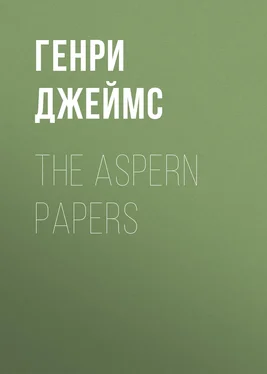Генри Джеймс - The Aspern Papers
Здесь есть возможность читать онлайн «Генри Джеймс - The Aspern Papers» — ознакомительный отрывок электронной книги совершенно бесплатно, а после прочтения отрывка купить полную версию. В некоторых случаях можно слушать аудио, скачать через торрент в формате fb2 и присутствует краткое содержание. Жанр: Социально-психологическая фантастика, foreign_antique, foreign_prose, на английском языке. Описание произведения, (предисловие) а так же отзывы посетителей доступны на портале библиотеки ЛибКат.
- Название:The Aspern Papers
- Автор:
- Жанр:
- Год:неизвестен
- ISBN:нет данных
- Рейтинг книги:5 / 5. Голосов: 1
-
Избранное:Добавить в избранное
- Отзывы:
-
Ваша оценка:
- 100
- 1
- 2
- 3
- 4
- 5
The Aspern Papers: краткое содержание, описание и аннотация
Предлагаем к чтению аннотацию, описание, краткое содержание или предисловие (зависит от того, что написал сам автор книги «The Aspern Papers»). Если вы не нашли необходимую информацию о книге — напишите в комментариях, мы постараемся отыскать её.
The Aspern Papers — читать онлайн ознакомительный отрывок
Ниже представлен текст книги, разбитый по страницам. Система сохранения места последней прочитанной страницы, позволяет с удобством читать онлайн бесплатно книгу «The Aspern Papers», без необходимости каждый раз заново искать на чём Вы остановились. Поставьте закладку, и сможете в любой момент перейти на страницу, на которой закончили чтение.
Интервал:
Закладка:
My emotion keeping me silent she spoke first, and the remark she made was exactly the most unexpected.
III
“Our house is very far from the center, but the little canal is very comme il faut.”
“It’s the sweetest corner of Venice and I can imagine nothing more charming,” I hastened to reply. The old lady’s voice was very thin and weak, but it had an agreeable, cultivated murmur, and there was wonder in the thought that that individual note had been in Jeffrey Aspern’s ear.
“Please to sit down there. I hear very well,” she said quietly, as if perhaps I had been shouting at her; and the chair she pointed to was at a certain distance. I took possession of it, telling her that I was perfectly aware that I had intruded, that I had not been properly introduced and could only throw myself upon her indulgence. Perhaps the other lady, the one I had had the honor of seeing the day before, would have explained to her about the garden. That was literally what had given me courage to take a step so unconventional. I had fallen in love at sight with the whole place (she herself probably was so used to it that she did not know the impression it was capable of making on a stranger), and I had felt it was really a case to risk something. Was her own kindness in receiving me a sign that I was not wholly out in my calculation? It would render me extremely happy to think so. I could give her my word of honor that I was a most respectable, inoffensive person and that as an inmate they would be barely conscious of my existence. I would conform to any regulations, any restrictions if they would only let me enjoy the garden. Moreover I should be delighted to give her references, guarantees; they would be of the very best, both in Venice and in England as well as in America.
She listened to me in perfect stillness and I felt that she was looking at me with great attention, though I could see only the lower part of her bleached and shriveled face. Independently of the refining process of old age it had a delicacy which once must have been great. She had been very fair, she had had a wonderful complexion. She was silent a little after I had ceased speaking; then she inquired, “If you are so fond of a garden why don’t you go to terra firma, where there are so many far better than this?”
“Oh, it’s the combination!” I answered, smiling; and then, with rather a flight of fancy, “It’s the idea of a garden in the middle of the sea.”
“It’s not in the middle of the sea; you can’t see the water.”
I stared a moment, wondering whether she wished to convict me of fraud. “Can’t see the water? Why, dear madam, I can come up to the very gate in my boat.”
She appeared inconsequent, for she said vaguely in reply to this, “Yes, if you have got a boat. I haven’t any; it’s many years since I have been in one of the gondolas.” She uttered these words as if the gondolas were a curious faraway craft which she knew only by hearsay.
“Let me assure you of the pleasure with which I would put mine at your service!” I exclaimed. I had scarcely said this, however, before I became aware that the speech was in questionable taste and might also do me the injury of making me appear too eager, too possessed of a hidden motive. But the old woman remained impenetrable and her attitude bothered me by suggesting that she had a fuller vision of me than I had of her. She gave me no thanks for my somewhat extravagant offer but remarked that the lady I had seen the day before was her niece; she would presently come in. She had asked her to stay away a little on purpose, because she herself wished to see me at first alone. She relapsed into silence, and I asked myself why she had judged this necessary and what was coming yet; also whether I might venture on some judicious remark in praise of her companion. I went so far as to say that I should be delighted to see her again: she had been so very courteous to me, considering how odd she must have thought me—a declaration which drew from Miss Bordereau another of her whimsical speeches.
“She has very good manners; I bred her up myself!” I was on the point of saying that that accounted for the easy grace of the niece, but I arrested myself in time, and the next moment the old woman went on: “I don’t care who you may be—I don’t want to know; it signifies very little today.” This had all the air of being a formula of dismissal, as if her next words would be that I might take myself off now that she had had the amusement of looking on the face of such a monster of indiscretion. Therefore I was all the more surprised when she added, with her soft, venerable quaver, “You may have as many rooms as you like—if you will pay a good deal of money.”
I hesitated but for a single instant, long enough to ask myself what she meant in particular by this condition. First it struck me that she must have really a large sum in her mind; then I reasoned quickly that her idea of a large sum would probably not correspond to my own. My deliberation, I think, was not so visible as to diminish the promptitude with which I replied, “I will pay with pleasure and of course in advance whatever you may think is proper to ask me.”
“Well then, a thousand francs a month,” she rejoined instantly, while her baffling green shade continued to cover her attitude.
The figure, as they say, was startling and my logic had been at fault. The sum she had mentioned was, by the Venetian measure of such matters, exceedingly large; there was many an old palace in an out-of-the-way corner that I might on such terms have enjoyed by the year. But so far as my small means allowed I was prepared to spend money, and my decision was quickly taken. I would pay her with a smiling face what she asked, but in that case I would give myself the compensation of extracting the papers from her for nothing. Moreover if she had asked five times as much I should have risen to the occasion; so odious would it have appeared to me to stand chaffering with Aspern’s Juliana. It was queer enough to have a question of money with her at all. I assured her that her views perfectly met my own and that on the morrow I should have the pleasure of putting three months’ rent into her hand. She received this announcement with serenity and with no apparent sense that after all it would be becoming of her to say that I ought to see the rooms first. This did not occur to her and indeed her serenity was mainly what I wanted. Our little bargain was just concluded when the door opened and the younger lady appeared on the threshold. As soon as Miss Bordereau saw her niece she cried out almost gaily, “He will give three thousand—three thousand tomorrow!”
Miss Tita stood still, with her patient eyes turning from one of us to the other; then she inquired, scarcely above her breath, “Do you mean francs?”
“Did you mean francs or dollars?” the old woman asked of me at this.
“I think francs were what you said,” I answered, smiling.
“That is very good,” said Miss Tita, as if she had become conscious that her own question might have looked overreaching.
“What do YOU know? You are ignorant,” Miss Bordereau remarked; not with acerbity but with a strange, soft coldness.
“Yes, of money—certainly of money!” Miss Tita hastened to exclaim.
“I am sure you have your own branches of knowledge,” I took the liberty of saying, genially. There was something painful to me, somehow, in the turn the conversation had taken, in the discussion of the rent.
“She had a very good education when she was young. I looked into that myself,” said Miss Bordereau. Then she added, “But she has learned nothing since.”
“I have always been with you,” Miss Tita rejoined very mildly, and evidently with no intention of making an epigram.
Читать дальшеИнтервал:
Закладка:
Похожие книги на «The Aspern Papers»
Представляем Вашему вниманию похожие книги на «The Aspern Papers» списком для выбора. Мы отобрали схожую по названию и смыслу литературу в надежде предоставить читателям больше вариантов отыскать новые, интересные, ещё непрочитанные произведения.
Обсуждение, отзывы о книге «The Aspern Papers» и просто собственные мнения читателей. Оставьте ваши комментарии, напишите, что Вы думаете о произведении, его смысле или главных героях. Укажите что конкретно понравилось, а что нет, и почему Вы так считаете.












